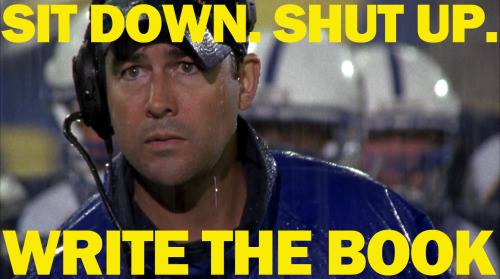 “Writer’s Block” is a lot like climate change: despite mounting evidence that it does, in fact, exist, some of us are still deep in denial. Until recently, I believed that provided a writer shows up to the desk every day, writing will occur, ergo “writer’s block” is a fallacy. I believed this until a new job, divorce, chronic fatigue, insomnia, an impending house move, and a cancer scare that inspired me to quit smoking with immediate effect plonked themselves at my feet and dared me to finish my novel revision. Because denial is a powerful thing, I repackaged my definitely not writer’s block a “Writing Slump” and stared balefully at my notebook for several weeks until finally admitting defeat and calling for backup, otherwise known as a cry for help, via the ever bountiful resource that is Facebook. Many of my writer friends answered my plea for advice with tips for crawling out of the writing black hole I’d found myself in, and I spent last weekend trying out their suggestions. If, like me, you’re living in denial, here are five tried and (varyingly) true methods for shaking the slump.
“Writer’s Block” is a lot like climate change: despite mounting evidence that it does, in fact, exist, some of us are still deep in denial. Until recently, I believed that provided a writer shows up to the desk every day, writing will occur, ergo “writer’s block” is a fallacy. I believed this until a new job, divorce, chronic fatigue, insomnia, an impending house move, and a cancer scare that inspired me to quit smoking with immediate effect plonked themselves at my feet and dared me to finish my novel revision. Because denial is a powerful thing, I repackaged my definitely not writer’s block a “Writing Slump” and stared balefully at my notebook for several weeks until finally admitting defeat and calling for backup, otherwise known as a cry for help, via the ever bountiful resource that is Facebook. Many of my writer friends answered my plea for advice with tips for crawling out of the writing black hole I’d found myself in, and I spent last weekend trying out their suggestions. If, like me, you’re living in denial, here are five tried and (varyingly) true methods for shaking the slump.
1. Play Squash
A few versions of this idea surfaced in response to my online plea. One friend said that she would set her novel aside temporarily in favor of an essay or a blog post. Another put it this way: when you’re sick of playing badminton, play squash. I had already tried this method during the Great Writer’s Block Denial of 2015, and it can be effective up to a point. I made good progress on a short story, tinkered tentatively with some nonfiction, and even wrote the beginning of another novel. But none of this made me want to go back to the novel at hand. Soon, all the changing around dissolved into random scribbling—half a poem, the first scratchings of story scene, the occasional ravings of a psyche slipping slowly into madness. Switching sports did keep me writing, though, so my routine didn’t fall apart altogether. But the longer it went on, the less likely it seemed that I’d ever return to the novel.
2. Invoke Coach Taylor
Otherwise known as “arse in chair.” A former writing professor of mine recommended I “invoke Coach Taylor” (I am reliably informed by American colleagues that this is a reference to popular culture), who yelled at me via image macro to “Sit down. Shut up. Write the book.” I’d been trying a version of this for some time, but I was missing a vital ingredient of my old routine—cigarettes—so the “just write” approach wasn’t enough. My brain needed rewiring. Enter: the writing retreat. This version of arse in chair—let’s call it “arse in slightly different chair”—is the Ultimate Frisbee edition of writerly discipline (I mean, probably; I’ve actually never played Ultimate Frisbee but I imagine it’s like regular frisbee with a slightly bigger frisbee). I hired a car, packed an enormous suitcase (one change of clothes, stack of books, music player, mammoth supply of ginger biscuits), and drove three hours out of Boston to a cabin in the woods. I haven’t yet re-read anything I wrote there, and most of it was typed with eyes screwed shut and fingers banging feverishly at the keys, but pages were generated, chapters were revised, novel writing was achieved. So, if simply “showing up” no longer works, consider going Ultimate Frisbee on your routine: change your location to somewhere with slightly higher stakes (coffee shop vs. home office, library vs. coffee shop), try a different method (handwrite instead of type, write in the dark, hang upside down) and, if circumstance allows, dedicate a long weekend to writing.
3. Talk It Out
Lucky me, I took a fellow writer to the cabin. Not so lucky them, tip #3 was to talk through the issues I’m having with my novel in the hope that I’d blabber my way past the blockage and back into the zone of productivity. This approach turned out to be helpful for my novel at large, if not for the slump itself. The writer in question had a wonderful suggestion for my opening chapters that would complicate (in the good way) a major decision my protagonist has to make. The only downside to this is that it created a brand new problem for the chapter I’d just spent weeks agonizing over, presenting me with a brand new mountain of work that made me even less inclined to pick up the pen. Conclusion: This method is best reserved for figuring out fiction problems rather than the problem of writing itself.
4. Take the Hemingway Approach
To my utter dismay, some of my Facebook acquaintances suggested an alcoholic remedy. On my first night in the cabin I (reluctantly, of course) tried drinking red wine while I wrote. This experiment yielded a full half an hour during which I felt like I didn’t quite hate my novel enough to not write it. But everything got a little too unfocused a little too quickly, and I found myself reading through old work and thinking, wistfully, about those golden days when I used to be a writer. Undeterred, on night two I went straight for the hard stuff: a capful of Wray and Nephew, an overproofed Jamaican rum that shouldn’t be drank so much as it should be sniffed from a distance of twenty feet, lest it burn off your nostril hairs. While it’s probably not a good idea for me to incorporate this method into my usual 6 a.m. writing routine, it actually had a surprising effect. I solved the problem created by the “talk it out” method in under five minutes (prompting a double-armed victory pose and triumphant shouts of, “the rum works!”). My rum addled brain saw past all the work involved in re-writing a chapter or three and just focused on how the story should be told. If your project needs some big picture perspective, I’m not not recommending that you grease the mind cogs with some liquid inspiration.
5. Do That Other Thing Writers Do
One reason a Writing Slump can feel so catastrophic is how it interacts with the questions we all ask ourselves from time to time: What makes a writer? And do I really fit the definition? For me, someone with a scanty list of publications (not sure it actually qualifies as a list if you can fit it on a single Post It note) and no official qualifier like an MFA to my name, “writer” is largely defined by practice. I have a routine; I regularly sit down and put pen to paper; I (had been) watching my novel slowly take shape for the last couple of years. All this allowed me to call myself “writer.” When that practice breaks down—when I bring pen to paper but can’t force it to make black squiggly shapes—I start to wonder, was I ever writer? Will I ever be? And when you begin to believe that perhaps you don’t nor ever will deserve that title, it becomes impossible to draw those black squiggly shapes across that page of blank white. This is when reading saves. If being a writer is all about practice, then that practice takes a bifurcated form: writing and reading. It’s no surprise that so many of the suggestions were about picking up a book—be it a book you love, a book you find useful, a book that achieves something you’re striving for—to reboot. My only caveat to this advice is do not under any circumstances pick up To The Lighthouse hoping it will teach you something about omniscient narration. It will teach you nothing but that Virginia Woolf is an unmatched fiction goddess whom you can never hope to emulate. In general, though, it’s always a good idea to go back to the source—the reason you began to write in the first place.




2 comments